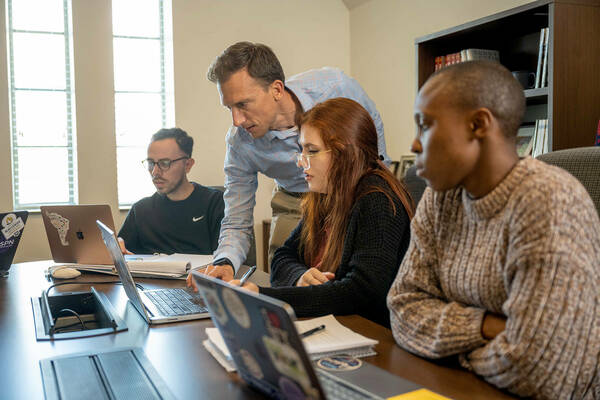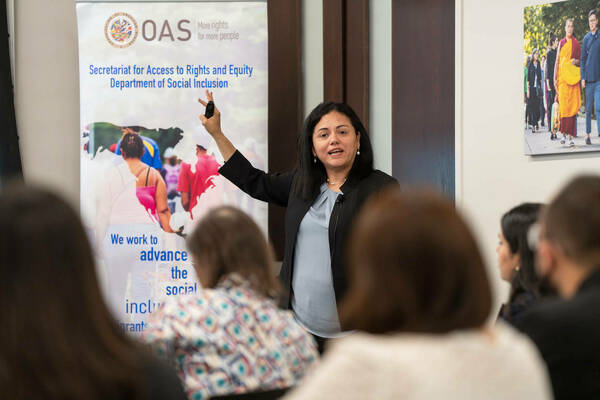Updated: August 2023
Keough School of Global Affairs
Overview
The Keough School of Global Affairs was established in 2014 as part of the University of Notre Dame’s commitment to internationalization. The School’s nine institutes and its Global Policy Initiative bring multidisciplinary, professional, and regional expertise to research initiatives and programs oriented toward policy and practice outcomes.
Having achieved a critical mass of dedicated faculty and staff, and students seeking degrees in the Keough School, we now turn to the second phase in the evolution of Notre Dame’s policy school. Organized around four areas of established and emerging research excellence, the Keough School’s Strategic Plan 2030 sets forth a bold vision of a policy school with a difference, and specifies goals and objectives to be achieved over the next seven years.
The mission of the Keough School—to advance integral human development—is decisive for how we conceptualize research, teaching, policy and practice, advocacy and global partnerships. A concept central to Catholic social teaching in pluralism-affirming dialogue with other religious and secular traditions, Integral Human Development (IHD) refers to the state of a society in which the irreducible dignity of the human person and the cultural and spiritual as well as the economic and material requirements of human flourishing are central to political and social life and upheld by the rule of law.
To embrace “the development of the whole person and of each person” in their specific socio-cultural context requires that we incorporate not only the social sciences but also the humanities and law, engineering and science, and regional expertise. As a policy school, we seek solutions to challenges in the areas of peace and violence, climate change, poverty, human rights, and governance. As an IHD-informed policy school, we seek those solutions in ways that promote the common good and prioritize the needs of the most vulnerable and marginalized populations. This commitment to IHD carries concrete consequences for where we work, how we work and how we measure impact and success.
Advancing IHD requires that we meet fundamental demands with respect to how development, poverty-alleviation, environmental, peacebuilding and governance processes and practices are designed, implemented and evaluated. An overarching question informing the Keough School’s research and related activities going forward, then, is: What difference would an IHD approach make to these practices and policies?
Inspired by this mission and vision, the Keough School’s Strategic Plan 2030 sets forth three research, teaching, and partnership goals to enhance the global influence of Notre Dame’s policy school.
Goals
1. Enhance and extend the Keough School’s reputation as a mission-driven global policy school grounded in cutting-edge research across four key areas of excellence.
Objectives

- Strengthen and extend research and teaching capacity through new faculty appointments in the School’s four core research programs.
-
Deepen the normative expertise and scholarship directed to the concept of integral human development and its application through dignity-based approaches that integrate these core research programs to serve the common good.
-
Prioritize research projects with colleagues in the Global South, including some of the sites recommended in the University’s Strategic Framework.
-
Expand the Ph.D. program and establish postdoctoral fellowship programs to support faculty research and train the next generation of researchers and leaders.
- Create an incentive and support structure for faculty and research staff to pursue ambitious ideas requiring collaborative multidisciplinary and interdisciplinary research.
2. Showcase the School’s many existing educational initiatives, and provide additional educational programs and co-curricular opportunities that more intentionally reflect the School’s four thematic areas of expertise, policy orientation, and IHD mission.
Objectives

- Offer new courses and co-curricular opportunities for both MGA students and undergraduate majors ensuring coverage across the four thematic areas of excellence, with an eye to preparing our graduates to become ambassadors for the common good in their personal and professional lives.
-
Improve communication to students, prospective students, and parents about the range of Keough School educational opportunities, including co-curricular as well as curricular programs across all the School’s institutes and centers, as well as the significance of experiential learning within the School.
-
Develop an honors track within the undergraduate major, giving students who wish to do in-depth research on a current global problem the opportunity to write a senior thesis based on robust programming in the Keough School.
-
Develop a team of specialists, built on the already successful team for the Master of Global Affairs (MGA) program, to help undergraduate students understand and pursue career paths after graduation.
-
Expand the MGA i-Lab program, which exemplifies how the School fosters interdisciplinary engagement and prepares students for a global employment landscape that demands integrated professional skillsets.
-
Expand the Ph.D. program, currently restricted to peace studies, to cover other dimensions of development and global affairs as articulated in the four core research programs described above.
3. Develop and/ or strengthen diverse research, policy, and practice partnerships and external engagement opportunities.
Objectives

- Provide regular policy-oriented capacity-building events for faculty, graduate students, and postdocs in the Keough School, across the University. Devise similar programs for, and outreach to, Keough School alumni.
-
Increase the School’s capacity for external policy engagement by hiring staff with substantive expertise in the School’s four thematic areas, as well as in the fields of knowledge management, research translation, and outreach.
-
Regularize interaction with policy practitioners—whether from international institutions, national governments, the NGO sector, or regional and local governments—through a carefully targeted visiting policy fellows’ program.
-
Establish sustained partnerships, networks and/or centers of policy research and outreach beyond Washington, D.C. by building on Notre Dame’s existing global gateways and presences; by drawing on the expertise of Notre Dame and Keough School alumni working in the policy arena; by forging links with policy actors at the local and national level around the world; and, by developing and/or strengthening research partnerships with universities and research institutes in the Global South.
- Establish expertise in how new technologies inform global affairs and policy research and education.
Learn more about the Keough School of Global Affairs by visiting keough.nd.edu.